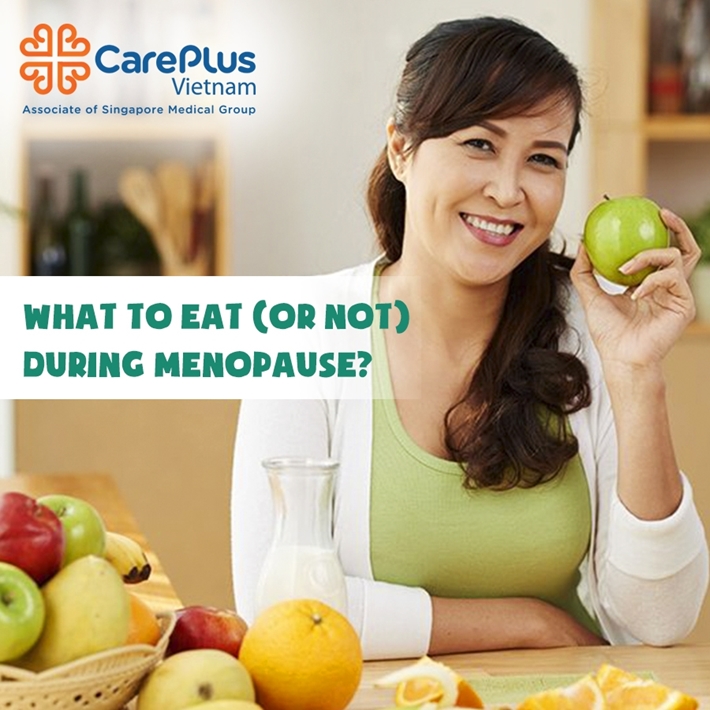What to eat (or not) during menopause?
Most people, when referring to ‘menopause’ will hear many negative symptoms such as hot flashes, irritability, weight gain and mood swings female. However, good nutrition can help prevent or ease some discomforts that develop during this transition period.

12/30/2021 4:01:58 PM
1. What is menopause?
Menopause is a natural transition in a woman’s aging process. Menopause, or perimenopause, usually begins four years before the last menstrual period. Perimenopause is characterized by irregular menstrual cycles, mood swings, and hot flashes. Menopause is when a woman has not had a period of 12 months. The mean age of menopause was 51.4 years. Menopause is caused by complete or near-complete depletion of ovarian follicles, resulting in low estrogen levels and high levels of follicle-STDmulating hormone.
According to the National InSTDtute on Aging, these hormonal changes cause the following symptoms of menopause:
- Mood swings and irritability
- Hot flashes
- Night sweats
- Vaginal dryness
- Reduced sex drive
- Urinary incontinence
- Sleep problems
- Memory problems
- Heart beat fast
- Weight gain
- Poor bone health or density
- Reduced muscle mass
2. Ideal nutrition to help relieve menopausal symptoms
Although menopause has many uncomfortable symptoms and increases the risk of several diseases, diet can help reduce symptoms during this transition.
Should eat
- Foods rich in calcium: During menopause, the absorption of calcium will be less. Therefore, women during this period need to eat and drink two to four servings of dairy products and calcium-rich foods per day. Calcium is found in dairy products, fish with bones (such as sardines and canned salmon), broccoli, and legumes. Aim you need to achieve 1200mg of calcium per day.
- Vitamin D: Your body needs to use vitamin D to absorb calcium. People between the ages of 51 and 70 should get 600 IU of vitamin D per day, and people over 70 should get 800 IU per day. Do not take more than 4,000 IU of vitamin D per day because this dose can damage the kidneys and weaken bones.
- Iron-rich foods: Eat at least three servings of iron-rich foods each day. Iron is found in lean red meat, poultry, fish, eggs, green vegetables, nuts and grain products enriched with nutrients, including iron. The Recommended Dietary Allowance (RDA) for iron in older women is 8 milligrams per day.
- Fiber: Foods rich in fiber help relieve conSTDpation and lower cholesterol and blood glucose levels in menopause. There are many foods rich in fiber, such as whole-grain breads, cereals, pasta, rice, fresh fruits and vegetables. Most adult women should get about 21g of fiber per day.
- Eat fruits and vegetables: Have at least 1 1/2 cups of fruit and 2 cups of fresh vegetables each day.
- Drink plenty of water: The general rule of thumb is that you need to drink eight glasses of water a day. This level suffices to meet the daily requirement for most healthy adults.
Should be limited
- Foods high in fat: Fat is recommended to provide 25% to 35% or less of total daily calories. In addition, you should also limit saturated fat to less than 7% of your total daily calories because saturated fat raises blood cholesterol and increases the risk of heart disease. Foods high in saturated fat such as fatty meats, whole milk, ice cream, and cheese. Limit and control cholesterol to less than 300mg per day. And you also need to be careful about the trans fats found in vegetable oils, many baked goods and margarine because trans fats also raise cholesterol and increase the risk of heart disease.
- Sugar and salt. Too much sodium in your diet can cause high blood pressure. In addition, you also need to limit smoked, salted and fermented foods because these foods are high in nitrates and have been linked to some cancers.
- Alcohol: Alcohol triggers hot flashes, headaches, night sweats, anxiety, and other symptoms of menopause. Therefore, women should avoid drinking alcohol after menopause as much as possible.
CarePlus now has a Menopause Health Screening Package to help women in perimenopause and menopause better understand their health status. At the same time, be consulted by a specialist for the advice on whether to use hormone replacement therapy and which therapy is most appropriate to relieve symptoms of this period.